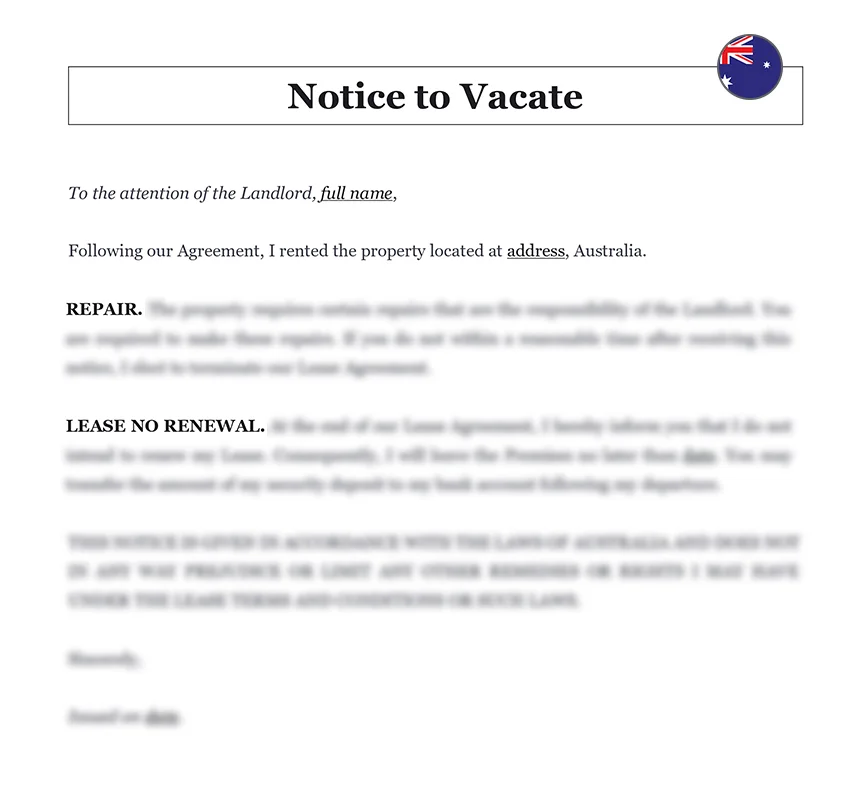Ready to use legal template
Drafted by experienced lawyers
Compliant with Australian law
Ready to use legal template
Drafted by lawyers
Compliant with Australian law
Home › Rent your property › Notice to vacate
Learn more about Notice to Vacate in Australia
In Australia, the Notice to Vacate Letter is a formal communication indicating the tenant’s intention to terminate the tenancy and vacate the rented premises by a specified date. Reasons for issuing a Notice to Vacate may vary, such as the end of the lease term or failure from the Landlord to repair. At Themis Partner, we understand the significance of adhering to legal procedures in such matters. Therefore, we provide an easy-to-edit legal template meticulously crafted by our experts to ensure compliance with Australian laws. This template simplifies the process of drafting a Notice to Vacate, offering clarity and legal assurance for both tenants and landlords.
Table of contents
-
How much notice must I give the landlord before leaving?
-
What must a Notice to Vacate include in Australia?
-
Can I leave the property before the lease ends if necessary?
-
What are my rights concerning the security deposit in Australia?
-
Will I incur any extra costs or fees when leaving the property?
-
Can I discuss the terms of the Notice to Vacate with the landlord?
-
What if the landlord refuses to accept the Notice to Vacate?
-
Must I state a reason for leaving in the Notice to Vacate?
-
What happens if I don't give the required notice before leaving?
How much notice must I give the landlord before leaving?
The amount of notice you must give the landlord before leaving in Australia depends on the type of tenancy agreement you have and the circumstances surrounding your departure. Generally, tenants are required to provide notice equal to the rental payment period, which is typically one month for monthly leases. However, the specific notice period may vary depending on state or territory legislation and the terms of your lease agreement. It’s essential to review your lease agreement and consult with local tenancy authorities to determine the appropriate notice period.
What must a Notice to Vacate include in Australia?
A Notice to Vacate in Australia must include specific details to be valid and enforceable. These details typically include the address of the rental property, the date the notice is issued, the intended date of vacation, and the reason for vacating (if applicable). Additionally, the notice should be signed by the tenant(s) and delivered to the landlord or property manager according to the methods specified in the lease agreement or tenancy laws. Failure to include essential information or follow proper notice procedures may render the notice invalid, leading to potential disputes or legal consequences.
Can I leave the property before the lease ends if necessary?
In some cases, tenants may need to leave the property before the lease ends due to unforeseen circumstances or changing life circumstances. However, tenants are generally bound by the terms of the lease agreement and obligated to fulfill their contractual obligations, including paying rent for the duration of the lease term. If you need to leave the property before the lease ends, it’s advisable to discuss your situation with the landlord or property manager and explore possible solutions, such as subletting the property or negotiating an early termination agreement. Additionally, tenants should review the terms of their lease agreement and consult with legal advisors or tenancy authorities to understand their rights and responsibilities in such situations.
What are my rights concerning the security deposit in Australia?
In Australia, tenants have rights concerning the security deposit, also known as the rental bond, provided to the landlord at the beginning of the tenancy. The security deposit is held as security against any potential damages to the property or unpaid rent at the end of the tenancy. Upon vacating the property, tenants are entitled to the return of the security deposit, less any deductions for damages beyond normal wear and tear or outstanding rent payments. The landlord must provide an itemized statement detailing any deductions from the security deposit within a specified timeframe, typically within a few weeks of the tenant’s departure. If tenants disagree with the deductions or the landlord fails to return the security deposit within the required timeframe, they may seek recourse through the relevant tenancy authority or dispute resolution mechanisms.
Will I incur any extra costs or fees when leaving the property?
When leaving a rental property in Australia, tenants may incur additional costs or fees depending on the terms of their lease agreement and the condition of the property upon vacating. Common costs or fees may include cleaning fees, repair costs for damages beyond normal wear and tear, outstanding rent payments, and any other expenses outlined in the lease agreement. Tenants should review the terms of their lease agreement carefully and address any outstanding obligations before vacating the property to avoid disputes or legal consequences. Additionally, tenants should communicate with the landlord or property manager to clarify any potential costs or fees and ensure a smooth transition.
Can I discuss the terms of the Notice to Vacate with the landlord?
Yes, tenants can discuss the terms of the Notice to Vacate with the landlord or property manager to clarify any questions or concerns and ensure mutual understanding of the circumstances surrounding the tenant’s departure. Open communication between tenants and landlords is essential for resolving issues amicably and reaching agreements that are fair and reasonable for both parties. Tenants may wish to schedule a meeting or communicate in writing to discuss the details of the Notice to Vacate, including the intended date of vacation, any outstanding obligations, and arrangements for the return of keys and the security deposit. By engaging in constructive dialogue, tenants and landlords can work together to facilitate a smooth transition and minimize potential conflicts.
What if the landlord refuses to accept the Notice to Vacate?
If the landlord refuses to accept the Notice to Vacate or disputes its validity, tenants should ensure that they have followed the proper procedures outlined in the lease agreement and relevant tenancy laws. In most cases, tenants are required to deliver the Notice to Vacate in writing and adhere to specific notice periods as stipulated in the lease agreement or tenancy legislation. If the landlord refuses to accept the notice without valid reasons, tenants may seek guidance from the relevant tenancy authority or legal advisors to understand their rights and options. It’s essential to document all communications and actions taken regarding the Notice to Vacate to support any potential dispute resolution processes or legal proceedings.
Must I state a reason for leaving in the Notice to Vacate?
In Australia, tenants are generally not required to state a reason for leaving in the Notice to Vacate unless specific circumstances or requirements apply, such as those outlined in the lease agreement or tenancy legislation. The Notice to Vacate should include essential details such as the intended date of vacation and the address of the rental property to ensure clarity and compliance with legal requirements. However, tenants may choose to provide a brief explanation for their departure as a courtesy to the landlord or property manager, particularly if it relates to significant issues or concerns during the tenancy. Ultimately, the decision to disclose reasons for leaving is at the discretion of the tenant, and they should prioritize compliance with legal obligations and effective communication with the landlord.
What happens if I don't give the required notice before leaving?
If tenants fail to give the required notice before leaving the property, they may be in breach of the lease agreement, and the landlord may take legal action to enforce the terms of the agreement. Consequences for failing to provide proper notice may include financial penalties, forfeiture of the security deposit, or legal proceedings to recover unpaid rent or damages. Additionally, tenants may damage their rental history or credit rating, making it more challenging to secure future rental accommodations. It’s crucial for tenants to review the terms of their lease agreement and adhere to the notice requirements to avoid potential disputes or legal consequences. If unforeseen circumstances prevent tenants from providing the required notice, they should communicate with the landlord or property manager as soon as possible to discuss possible solutions and minimize negative impacts.
Notice to VacateTemplate (.docx)
Easy and quick to customize
310 client reviews (4.8/5) ⭐⭐⭐⭐⭐
Share information
Why Themis Partner ?
Make documents forhundreds of purposes
Hundreds of documents
Instant access to our entire library of documents for Australia.
24/7 legal support
Free legal advice from our network of qualified lawyers.
Easily customized
Editable Word documents, unlimited revisions and copies.
Legal and Reliable
Documents written by lawyers that you can use with confidence.




